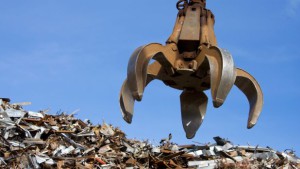In India, a country with a population of over 1.2 billion, metal recycling sector is striving. Indian metal recycling industry is highly unorganized and large volumes of unaccountable/non segregated scrap is inadequately utilized. As a result, there is more burden on primary production which depletes our natural resources.

With the recent announcement of Swachh Bharat, the Indian recycling industry got the much needed wakeup call to convert large amounts of recycled metal scrap into secondary raw material which can help convert waste into wealth for the nation. Experts believe that India should actively promote organized scrap recycling clusters like developed countries. This enables conservation of natural resources and key utilities.
As per the Frost & Sullivan’s Metals and Minerals Practice, the Indian Metal Recycling industry is challenged by key interlocking crises of minimal existence of a metal scrap recycling eco system and lack of any domestic laws and legislation that assist and apply to the industry. For example, End of Life Vehicle legislation does not exist; there is an inverted duty structure Free Trade Agreements (FTA) for duty free imports into India of finished metal products while metal scrap is still levied with import duty; accumulation of CENVAT credit of major metal recycling companies is lying idle with the Government which is hurting the existing metal recycling companies.
The use of Metal Scrap is actively promoted by many developed and developing nations as Carbon footprint reduction is a key priority. The overall Indian recycling rate is a mere 20 – 25 percent, the USA is a net exporter of scrap with recycling rates of 80 – 90 percent, Turkey is the largest importer of steel scrap, and Europe has recycling rates in excess of 70 percent.
Developed nations follow an industrial cluster model, where collections centers, end customers, scrap yards, scrap processing centers, and logistical support are in proximity and integrated under one roof (Metal Recycling Zone). Improving scrap consumption is one step towards reducing Carbon footprint under the Kyoto Protocol agreement, a need of the hour for a large nation like India.
Brazil has the highest used beverage cans (UBC) recycling rate in the world – around 98.5 percent which results in power savings of 3.870 GWh.
Japan has a well-organized 1,850 municipalities that are responsible for metal collection. With a strong network of 800 recyclers in steel making, Japan has moved away from ore, to producing through the secondary steel route.
The UK scrap dealers obtain licences from the local council in order to prevent stolen metals. Payment is accepted only through cheque or E-transfer.
In the GCC, the Saudi Arabian Government created Scrap Metal Centers (SMCs) near major industrial hubs and scrap yards were shifted to these locations. SMCs promoted by the Government are equipped with shredders, separators, etc. In the UAE, major recycling clusters and free zones are situated in Jebel Ali.Dubai is a key strategic destination to export clean scrap to the world.
Metal recycling offers multiple benefits to the Indian Economy. Key impetus should be to create new, direct, and indirect employment, increase foreign direct investment (FDI), technology development through joint ventures, reduce basic import duty on scrap to zero, and give impetus to metal recyclers to grow and contribute to the Indian GDP.
The Indian Government, in order to be a net earner, as a first step, can remove the basic import duty, offer SEZ benefits which will enable industry status for metal recycling sector, subsidize lending rates, and increase financing facilities. Post this, Carbon credits should be awarded, a single window set up for centralized integrated policies, tax holidays, and lower lending rates will provide key impetus to the industry to boost investment in the sector. Support from Central and State Governments to promote metal recycling will be a key factor moving forward. Promoting FDI in Indian metal recycling will ensure quicker technology adaptation and best practices from overseas players which will uplift the overall recycling industry.



